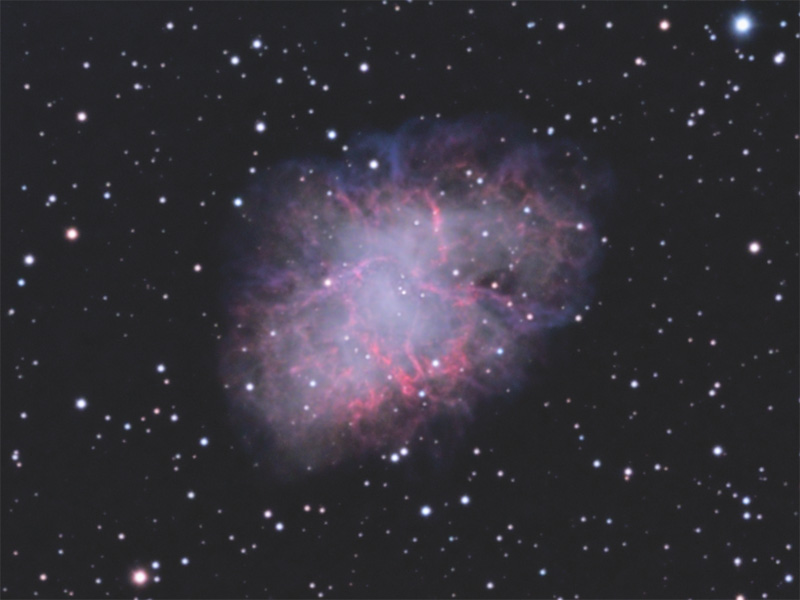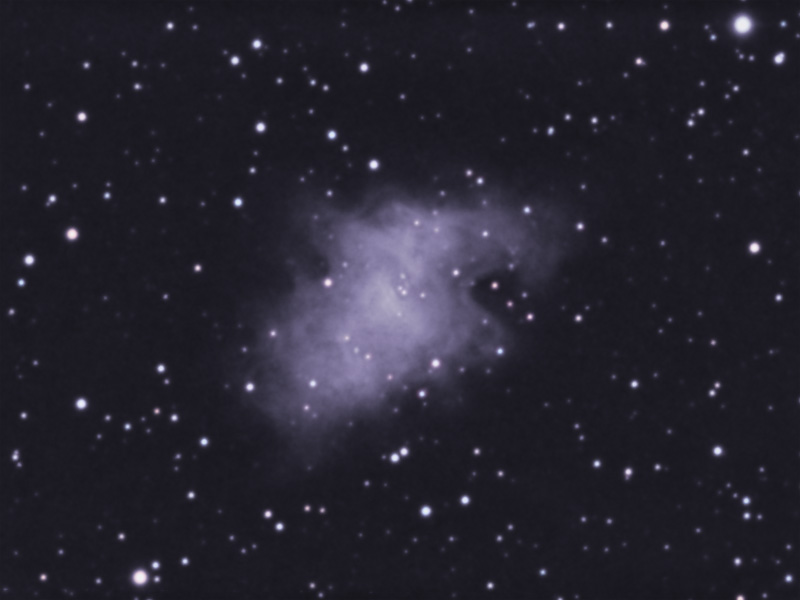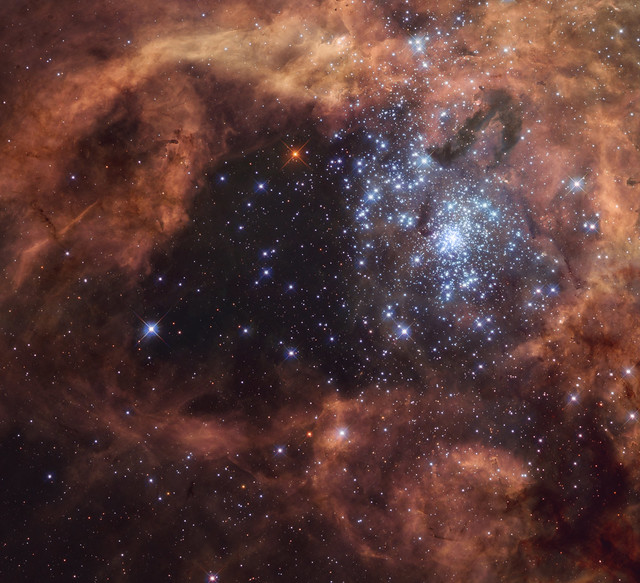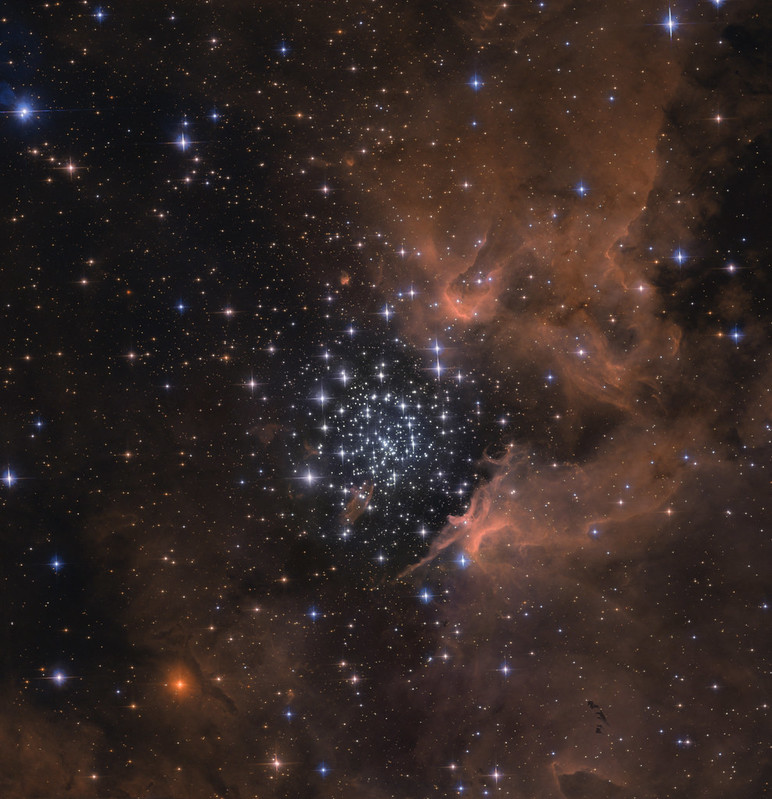Submissions: 2013 July
-
whwiii
- Ensign
- Posts: 18
- Joined: Mon Oct 04, 2010 8:13 pm
- AKA: bill w
- Location: southern california
- Contact:
Submissions: 2013 July
__________________________________________________________________________________________________
Please post your images here.
Please see this thread before posting images; posting images demonstrates your agreement with
the possible uses for your image.
Please keep images under 400K, whether hotlinked or uploaded.
Thank you!
_________________________________________________________________________________________________
<- Previous submissions
[c]«« Discuss Anything in Astronomy «» Visit The Asterisk Main Page «» See Introductory Astonomy Lectures »»
«« Introduce Yourself «» Please Read the Rules »»[/c]
On July 4th 1054 AD, astrologers observed a bright blue square in the sky near the sun at dawn. it was visible during the day for 3 weeks and at night for 2 years. 700 years later, the Crab Nebula became the first object in Charles Messier's famous catalog:
What makes the crab nebula glow? The bluer of the two central stars is a dense neutron star,
the remnant of the original star compressed so tightly that separate protons and electrons cannot exist. Due to the conservation of angular momentum the tiny neutron star is spinning at 30 revolutions per second. A strong magnetic field associated with the spinning star
accelerates electrons in the surrounding space to relativistic speeds ~half the speed of light!
Collisions between the electrons and surrounding gas give off very high energy photons. Rather than the central star, it is the photons from these collisions that cause the surrounding filaments to glow like fluorescent lights.
EDIT: be sure to hover over the image with mouse to see the pulsar wind, imaged with a special filter to eliminate the narrow band emissions, or see blink below.
thank you for your consideration
-bill warden
http://whwastro.homestead.com/files/Cra ... -blink.gif
Please post your images here.
Please see this thread before posting images; posting images demonstrates your agreement with
the possible uses for your image.
Please keep images under 400K, whether hotlinked or uploaded.
Thank you!
_________________________________________________________________________________________________
<- Previous submissions
[c]«« Discuss Anything in Astronomy «» Visit The Asterisk Main Page «» See Introductory Astonomy Lectures »»
«« Introduce Yourself «» Please Read the Rules »»[/c]
On July 4th 1054 AD, astrologers observed a bright blue square in the sky near the sun at dawn. it was visible during the day for 3 weeks and at night for 2 years. 700 years later, the Crab Nebula became the first object in Charles Messier's famous catalog:
What makes the crab nebula glow? The bluer of the two central stars is a dense neutron star,
the remnant of the original star compressed so tightly that separate protons and electrons cannot exist. Due to the conservation of angular momentum the tiny neutron star is spinning at 30 revolutions per second. A strong magnetic field associated with the spinning star
accelerates electrons in the surrounding space to relativistic speeds ~half the speed of light!
Collisions between the electrons and surrounding gas give off very high energy photons. Rather than the central star, it is the photons from these collisions that cause the surrounding filaments to glow like fluorescent lights.
EDIT: be sure to hover over the image with mouse to see the pulsar wind, imaged with a special filter to eliminate the narrow band emissions, or see blink below.
thank you for your consideration
-bill warden
http://whwastro.homestead.com/files/Cra ... -blink.gif
Last edited by whwiii on Tue Jul 02, 2013 6:31 am, edited 2 times in total.
-
Thomas Earle
Re: Submissions: 2013 June
- goldpaintphoto
- Ensign
- Posts: 44
- Joined: Sun May 15, 2011 11:08 pm
- Location: Mount Shasta, CA
- Contact:
Re: Submissions: 2013 July
Seven Peaks
http://goldpaintphotography.com/
Copyright: Brad Goldpaint
This weekend I labored through a brutal 18 mile trek over steep terrain, post holing through slippery snow fields, trudging into mosquito infested hatchery’s, while packing a full set of camera and camping equipment. However, I can honestly say this astonishing view was worth every step. I was blessed with clear skies during the first few hours of the night, in addition to the aurora borealis making a glowing appearance. In this panoramic image, you can spot each of the seven peaks making up a portion of the Cascade Range. From left to right: Broken Top, South Sister (Charity), Middle Sister (Hope), North Sister (Faith), Mount Washington, Three Fingered Jack, and Mount Jefferson.
http://goldpaintphotography.com/
Copyright: Brad Goldpaint
This weekend I labored through a brutal 18 mile trek over steep terrain, post holing through slippery snow fields, trudging into mosquito infested hatchery’s, while packing a full set of camera and camping equipment. However, I can honestly say this astonishing view was worth every step. I was blessed with clear skies during the first few hours of the night, in addition to the aurora borealis making a glowing appearance. In this panoramic image, you can spot each of the seven peaks making up a portion of the Cascade Range. From left to right: Broken Top, South Sister (Charity), Middle Sister (Hope), North Sister (Faith), Mount Washington, Three Fingered Jack, and Mount Jefferson.
Re: Submissions: 2013 July
IC1318 (the Butterfly nebula) in monochrome
Copyright: Sara Wager
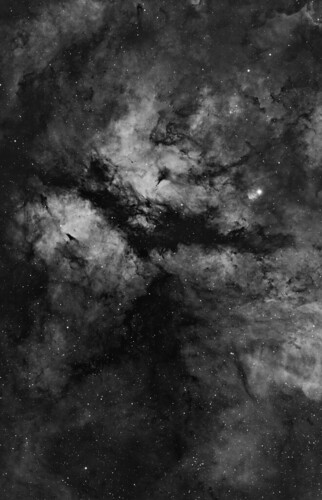
IC1318 (the Butterfly nebula) # Explored by swag72, on Flickr
Copyright: Sara Wager

IC1318 (the Butterfly nebula) # Explored by swag72, on Flickr
Re: Submissions: 2013 July
near
overview, 11" after
not so near, 12" after
Re: Submissions: 2013 July
30 Doradus
Hi Res link: http://farm4.staticflickr.com/3729/9168 ... af66_h.jpg
R136 Region of the Tarantula Nebula (also known as 30 Doradus, or NGC 2070), an H II region in the Large Magellanic Cloud (LMC). Compact star cluster R136 (approximate diameter 35 light years) produces most of the energy that makes the nebula visible.-Wiki
Hubble Legacy Archive Data set:
hst_11360_d3_wfc3_uvis_f438w_sci(Blue)
hst_11360_d5_wfc3_uvis_f438w_sci(Blue)
hst_11360_d6_wfc3_uvis_f555w_sci(Green)
hst_11360_d7_wfc3_uvis_f555w_sci(Green)
hst_11360_d1_wfc3_uvis_f814w_sci(Red)
hst_11360_r8_wfc3_uvis_f814w_sci(Red)
Ha data: (Red)
hst_11360_d1_wfc3_uvis_f656n_sci
hst_11360_d2_wfc3_uvis_f656n_sci
hst_11360_d3_wfc3_uvis_f656n_sci
hst_11360_d4_wfc3_uvis_f656n_sci
hst_11360_d5_wfc3_uvis_f656n_sci
hst_11360_d6_wfc3_uvis_f656n_sci
hst_11360_r8_wfc3_uvis_f656n_sci
R136 Region of the Tarantula Nebula (also known as 30 Doradus, or NGC 2070), an H II region in the Large Magellanic Cloud (LMC). Compact star cluster R136 (approximate diameter 35 light years) produces most of the energy that makes the nebula visible.-Wiki
Hubble Legacy Archive Data set:
hst_11360_d3_wfc3_uvis_f438w_sci(Blue)
hst_11360_d5_wfc3_uvis_f438w_sci(Blue)
hst_11360_d6_wfc3_uvis_f555w_sci(Green)
hst_11360_d7_wfc3_uvis_f555w_sci(Green)
hst_11360_d1_wfc3_uvis_f814w_sci(Red)
hst_11360_r8_wfc3_uvis_f814w_sci(Red)
Ha data: (Red)
hst_11360_d1_wfc3_uvis_f656n_sci
hst_11360_d2_wfc3_uvis_f656n_sci
hst_11360_d3_wfc3_uvis_f656n_sci
hst_11360_d4_wfc3_uvis_f656n_sci
hst_11360_d5_wfc3_uvis_f656n_sci
hst_11360_d6_wfc3_uvis_f656n_sci
hst_11360_r8_wfc3_uvis_f656n_sci
-
IanP
- Science Officer
- Posts: 135
- Joined: Fri Jan 06, 2012 5:21 am
- Location: Perth, Western Australia
- Contact:
M20/2013
M20---
20 subs (CPC 925 and 60Da, 90sec@ISO3200) taken on the 1st July 2013 in Perth, Western Australia, in almost "perfect" winter conditions: extremely good visibility caused by low humidity and <1km/h dry north-easterly wind ...Higer res @
http://westcoastpics23.blogspot.com.au/?view=flipcard
20 subs (CPC 925 and 60Da, 90sec@ISO3200) taken on the 1st July 2013 in Perth, Western Australia, in almost "perfect" winter conditions: extremely good visibility caused by low humidity and <1km/h dry north-easterly wind ...Higer res @
http://westcoastpics23.blogspot.com.au/?view=flipcard
Re: Submissions: 2013 July
Panoramica de la Vía Láctea desde las Minas de San Jose en El Parque Nacional del Teide, Tenerife
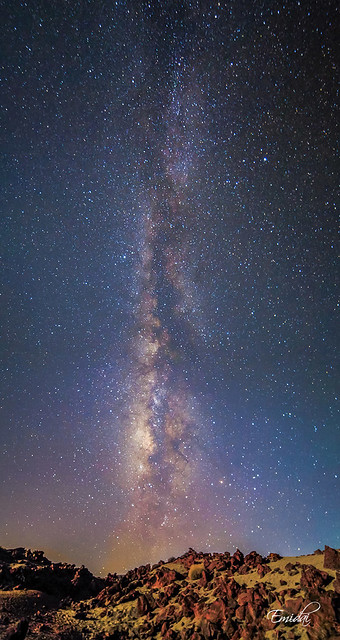
Panoramica vertical de La Vía lactea por Emidai (Emilio&Idaira), en Flickr
Roque Cinchado (árbol de piedra)
Composición de La Vía Láctea y el Roque Cinchado en El Parque Nacional del Teide. Tenerife.
Email: emidai11@gmail.com.
Sitio web, http://www.flickr.com/photos/60837043@N02/; http://500px.com/emidai; https://www.facebook.com/#!/FotosEmidai?fref=ts
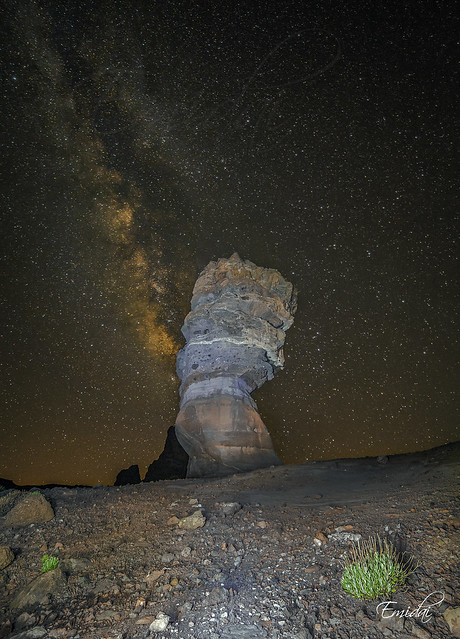
Roque cinchado por Emidai (Emilio&Idaira), en Flickr
Email: emidai11@gmail.com.
Sitio web, http://www.flickr.com/photos/60837043@N02/; http://500px.com/emidai; https://www.facebook.com/#!/FotosEmidai?fref=ts
-
ftherrmann
- Science Officer
- Posts: 141
- Joined: Sun Jan 30, 2011 2:56 am
Re: Submissions: 2013 July
Cygnus
http://fth.bounceme.net/
Here’s a mega-sized image of the constellation Cygnus (The Swan). This is a 9 panel mosaic spanning a field of view of 30x21 degrees.
Copyright: Fred Herrmann All rights reserved.
http://fth.bounceme.net/
Here’s a mega-sized image of the constellation Cygnus (The Swan). This is a 9 panel mosaic spanning a field of view of 30x21 degrees.
Copyright: Fred Herrmann All rights reserved.
-
Turnit Tops
- Ensign
- Posts: 38
- Joined: Thu Jun 27, 2013 8:26 am
Re: Submissions: 2013 July
Click to play embedded YouTube video.
instrument (High-resolution Coronal Imager) have uncovered an amazing
amount of detail within the hot outer atmosphere of the Sun (the
corona).
Movie top right: “blobs” of electrified gas (plasma) racing along
magnetic highways at strands with material moving along them at up to
80 km/s.
Movie bottom left: solar “sparkles” switching off and on in under 30
seconds, releasing energy into the solar corona.
Caption: An image of an active, magnetically complicated region of the
Sun captured by the new Hi-C instrument. It shows plasma in the outer
solar atmosphere at a temperature of 1-2 million degrees Celsius. The
inset box at bottom left shows ‘sparkle’ features that are releasing
vast amounts of energy into the corona. The box at top right shows a
close-up of part of a solar filament where ‘blobs’ of solar plasma
flow along thread-like ‘highway’ structures. Credits: NASA MSFC and
UCLan.
Copyright: UCLan, Royal Astronomical Society
Caption: after a pretty lame June aurora wise, they finally picking up again
and when I was out a few hours ago there was a super bright meteor,
definitely the best one I saw in my 9 years down here. We don't get as
many here at the Pole since we kind of look out of the "side window"
The exposure time was only 5 sec for the left and 8 sec for the right
image so I had to stack two images in both cases. (ISO 6400 for both
pictures) on the fisheye image you can see the second camera in the
foreground which produced the left image.
Copyright: Robert Schwarz
Caption: a fascinating bit of the Vela Supernova Remnant, one of the best examples of the
aftermath of a supernova explosion. Pictured here is a delicate wisp
in the southern part of the remnant never imaged.
I used narrowband filters Ha and OIII to enhance the visibility of
this faint nebula on a RGB base totaling over 11 hours of exposure.
Copyright: Marco Lorenzi
Caption: I took a series of photos just below the summit of Mount Evans in
Colorado last Friday evening, where the Mount Evans Meyer-Womble
Observatory sits at over 14,000 feet. I caught dozens of images of an
exciting lightning storm filling the sky over the observatory, one of
which I wanted to submit for consideration of use on APOD.
Copyright: Todd Caudle
Caption: I’m a fairly keen amateur astrophotographer and normally use an
expensive array of CCDs, autoguided mounts and telescopes to take
pictures that are nearly, but not quite as good as those you publish.
Last Saturday I was parked out in the country, with only a DSLR, a
tripod and a lightweight tracking device and took this picture
directly overhead. It reminded me of what got me interested in the sky
in the first place as a child in a small country town in the 1907s;
just seeing the milky way arcing overhead with the naked eye.
Copyright: Andrew Lockwood
-
Turnit Tops
- Ensign
- Posts: 38
- Joined: Thu Jun 27, 2013 8:26 am
Re: Submissions: 2013 July
After taking a few pictures of the setting full Moon over Assos on
23rd June, I waited for 3 days for the bright Moon to depart the early
evening hours to shoot a few more photos in more familiar conditions.
In the evening of 25th June, there would be a dark sky window of about
half an hour, between the fading twilight and rising Moon. I want to
submit these four pictures of the sky as seen from Assos for APOD.
Assos is located on a about 70 km south of Çanakkale in NW Turkey.
Archaeological grounds and especially Athena Temple overlook Aegean
Sea from a promontory 200 m above sea level. This is also very close
to the westernmost tip of mainland Turkey and the whole continent of
Asia as well:
http://en.wikipedia.org/wiki/Assos
This picture is wide view of the western sky
from Athena Temple, as the twilight faded. Venus, Pollux and Castor,
forming a straight line, were about to set, Cancer and Leo soon to
follow.
I photographed this southern panorama of the bulge of
the Milky Way rising above Athena Temple during the short window of
dark sky. Southern constellations of Lupus and Centaurus are soon to
depart the sky, while wide pairing of Saturn and Spica were high in
the southwest.
This is a few minutes after moonrise, with some Milky
Way still remaining visible. The perigee full Moon of 22-23 June is
now fainter. It is also way smaller, as I did not use a telephoto
lens, but a wide angle one.
Then I left the grounds, drove to lower elevations
to check out the theatre. The Moon was higher and shining bright,
providing natural lighting to the theathe as it did for the last 24
centuries.
Copyright: Tunç Tezel
23rd June, I waited for 3 days for the bright Moon to depart the early
evening hours to shoot a few more photos in more familiar conditions.
In the evening of 25th June, there would be a dark sky window of about
half an hour, between the fading twilight and rising Moon. I want to
submit these four pictures of the sky as seen from Assos for APOD.
Assos is located on a about 70 km south of Çanakkale in NW Turkey.
Archaeological grounds and especially Athena Temple overlook Aegean
Sea from a promontory 200 m above sea level. This is also very close
to the westernmost tip of mainland Turkey and the whole continent of
Asia as well:
http://en.wikipedia.org/wiki/Assos
This picture is wide view of the western sky
from Athena Temple, as the twilight faded. Venus, Pollux and Castor,
forming a straight line, were about to set, Cancer and Leo soon to
follow.
I photographed this southern panorama of the bulge of
the Milky Way rising above Athena Temple during the short window of
dark sky. Southern constellations of Lupus and Centaurus are soon to
depart the sky, while wide pairing of Saturn and Spica were high in
the southwest.
This is a few minutes after moonrise, with some Milky
Way still remaining visible. The perigee full Moon of 22-23 June is
now fainter. It is also way smaller, as I did not use a telephoto
lens, but a wide angle one.
Then I left the grounds, drove to lower elevations
to check out the theatre. The Moon was higher and shining bright,
providing natural lighting to the theathe as it did for the last 24
centuries.
Copyright: Tunç Tezel
-
Turnit Tops
- Ensign
- Posts: 38
- Joined: Thu Jun 27, 2013 8:26 am
Re: Submissions: 2013 July
Caption: Here is globular cluster NGC 6752 in Pavo captured in colour on July
2nd from Siding Spring. The third brightest globular in the sky behind
Omega Cen and 47 Tuc. You really don't see many images of it which is
surprising really as its certainly a beautiful cluster in its own
right.
Image (3MB:) http://www.damianpeach.com/deepsky/ngc6 ... 7_02dp.jpg
20"CDK @ F4.5. FLI-PL6303E camera. LRGB. L: 20mins. RGB: 3mins.
Calibrated and processed with Maxim DL5 and PS.
Copyright: Damian Peach
2nd from Siding Spring. The third brightest globular in the sky behind
Omega Cen and 47 Tuc. You really don't see many images of it which is
surprising really as its certainly a beautiful cluster in its own
right.
Image (3MB:) http://www.damianpeach.com/deepsky/ngc6 ... 7_02dp.jpg
20"CDK @ F4.5. FLI-PL6303E camera. LRGB. L: 20mins. RGB: 3mins.
Calibrated and processed with Maxim DL5 and PS.
Copyright: Damian Peach
Re: Submissions: 2013 July
NGC 3603
Hi Res link: http://farm8.staticflickr.com/7366/9135 ... caba_h.jpg
NGC 3603 is an open cluster of stars situated in the Carina spiral arm of the Milky Way around 20,000 light-years away from the Solar System. It is surrounded by the most massive visible cloud of glowing gas and plasma known as a H II region in the Milky Way. HD 97950 is the central star of star cluster, the densest concentration of very massive stars known in the galaxy. Strong ultraviolet radiation and stellar winds have cleared the gas and dust, giving an unobscured view of the cluster. -Wiki
Hubble Legacy Archive Data set:
HST_10602_a5_ACS_WFC_F435W_sci (Blue)
HST_10602_a5_ACS_WFC_F550M_sci (Green)
HST_10602_a5_ACS_WFC_F850LP_sci (Red)
hst_11360_a1_wfc3_uvis_f656n_sci (Red)
This data was used for the core:
HST_10602_05_ACS_HRC_F435W_sci
HST_10602_05_ACS_HRC_F550M_sci
HST_10602_05_ACS_HRC_F850LP_sci
hst_06763_01_wfpc2_f547m_wf_sci
hst_06763_01_wfpc2_f675w_wf_sci
hst_06763_01_wfpc2_f814w_wf_sci
Lots of blue stars for Ann!
NGC 3603 is an open cluster of stars situated in the Carina spiral arm of the Milky Way around 20,000 light-years away from the Solar System. It is surrounded by the most massive visible cloud of glowing gas and plasma known as a H II region in the Milky Way. HD 97950 is the central star of star cluster, the densest concentration of very massive stars known in the galaxy. Strong ultraviolet radiation and stellar winds have cleared the gas and dust, giving an unobscured view of the cluster. -Wiki
Hubble Legacy Archive Data set:
HST_10602_a5_ACS_WFC_F435W_sci (Blue)
HST_10602_a5_ACS_WFC_F550M_sci (Green)
HST_10602_a5_ACS_WFC_F850LP_sci (Red)
hst_11360_a1_wfc3_uvis_f656n_sci (Red)
This data was used for the core:
HST_10602_05_ACS_HRC_F435W_sci
HST_10602_05_ACS_HRC_F550M_sci
HST_10602_05_ACS_HRC_F850LP_sci
hst_06763_01_wfpc2_f547m_wf_sci
hst_06763_01_wfpc2_f675w_wf_sci
hst_06763_01_wfpc2_f814w_wf_sci
Lots of blue stars for Ann!
Last edited by stephen63 on Wed Jul 03, 2013 3:47 pm, edited 1 time in total.
Re: Submissions: 2013 July
The False Comet
http://www.pleiades.hu/en/index.php
Copyright: Lorand Fenyes
Normal size: http://www.pleiades.hu/galeria/kozmosz2 ... mal/55.jpg
The first time I heard of this object was the
book of Stephen James O'Meara - The Messier Objects. (Sky Publ. Corp.,
Cambridge Univ. Press. 1998.). The writer describe that there is a
strange object group in Scorpius constellation which looks as if
beautiful and bright comet streaks across the southern sky. I just came
back from Namibia and that was true: it was
perceptible to the naked eye very clearly! And it is bewilderingly looks
like a real comet. NGC6231 is the head and the other objects (mainly the
IC4628) give the tail. Maybe it is not so impulsive as
the famous southern bright nebulas but I think it is real interesting.
SkyWatcher EQ-6, Canon EOS600D (modified), 200mm, 57 x 120min ISO 1600
Namibia, Farm Isabis, 10-06-2016
http://www.pleiades.hu/en/index.php
Copyright: Lorand Fenyes
Normal size: http://www.pleiades.hu/galeria/kozmosz2 ... mal/55.jpg
The first time I heard of this object was the
book of Stephen James O'Meara - The Messier Objects. (Sky Publ. Corp.,
Cambridge Univ. Press. 1998.). The writer describe that there is a
strange object group in Scorpius constellation which looks as if
beautiful and bright comet streaks across the southern sky. I just came
back from Namibia and that was true: it was
perceptible to the naked eye very clearly! And it is bewilderingly looks
like a real comet. NGC6231 is the head and the other objects (mainly the
IC4628) give the tail. Maybe it is not so impulsive as
the famous southern bright nebulas but I think it is real interesting.
SkyWatcher EQ-6, Canon EOS600D (modified), 200mm, 57 x 120min ISO 1600
Namibia, Farm Isabis, 10-06-2016
-
Maria Rosa Vila
- Ensign
- Posts: 30
- Joined: Tue Jun 12, 2012 9:39 pm
- AKA: MR
- Location: Barcelona, Spain
- Contact:
A sun pillar over Catalonia
I was surprised last June 29 to encounter a sun pillar when I was walking near a budism monestry in Catalonia (Spain), and immediately took these pictures.
Copyright: Maria Rosa Vila
Copyright: Maria Rosa Vila
Re: Submissions: 2013 July
Thank you so much, Stephen, you know I just love that image!!!stephen63 wrote:
Lots of blue stars for Ann!
And thanks to everyone else here who have posted images. Keep 'em coming!
Ann
Color Commentator
-
SalvatoreGrasso
- Ensign
- Posts: 38
- Joined: Mon Sep 27, 2010 10:16 pm
Re: Submissions: 2013 July
Messier 82 - Starburst Galaxy
http://www.sgastrophotography.com
Copyright: Salvatore Grasso and Ryan Hannahoe ( http://www.Astronomicalimaging.com )
Follow this link to view image in full resolution
Messier 77 - Cetus A, Seyfert Galaxy
http://www.sgastrophotography.com
Copyright: Salvatore Grasso and Ryan Hannahoe ( http://www.Astronomicalimaging.com )
Follow this link to view image in full resolution
http://www.sgastrophotography.com
Copyright: Salvatore Grasso and Ryan Hannahoe ( http://www.Astronomicalimaging.com )
Follow this link to view image in full resolution
Messier 77 - Cetus A, Seyfert Galaxy
http://www.sgastrophotography.com
Copyright: Salvatore Grasso and Ryan Hannahoe ( http://www.Astronomicalimaging.com )
Follow this link to view image in full resolution
Re: Submissions: 2013 July
NGC3372 Eta Carinae
http://astronomiapampeana.com.ar/foto/1 ... ebula.html
Copiright: Adriana Fernandez y Leonardo Julio
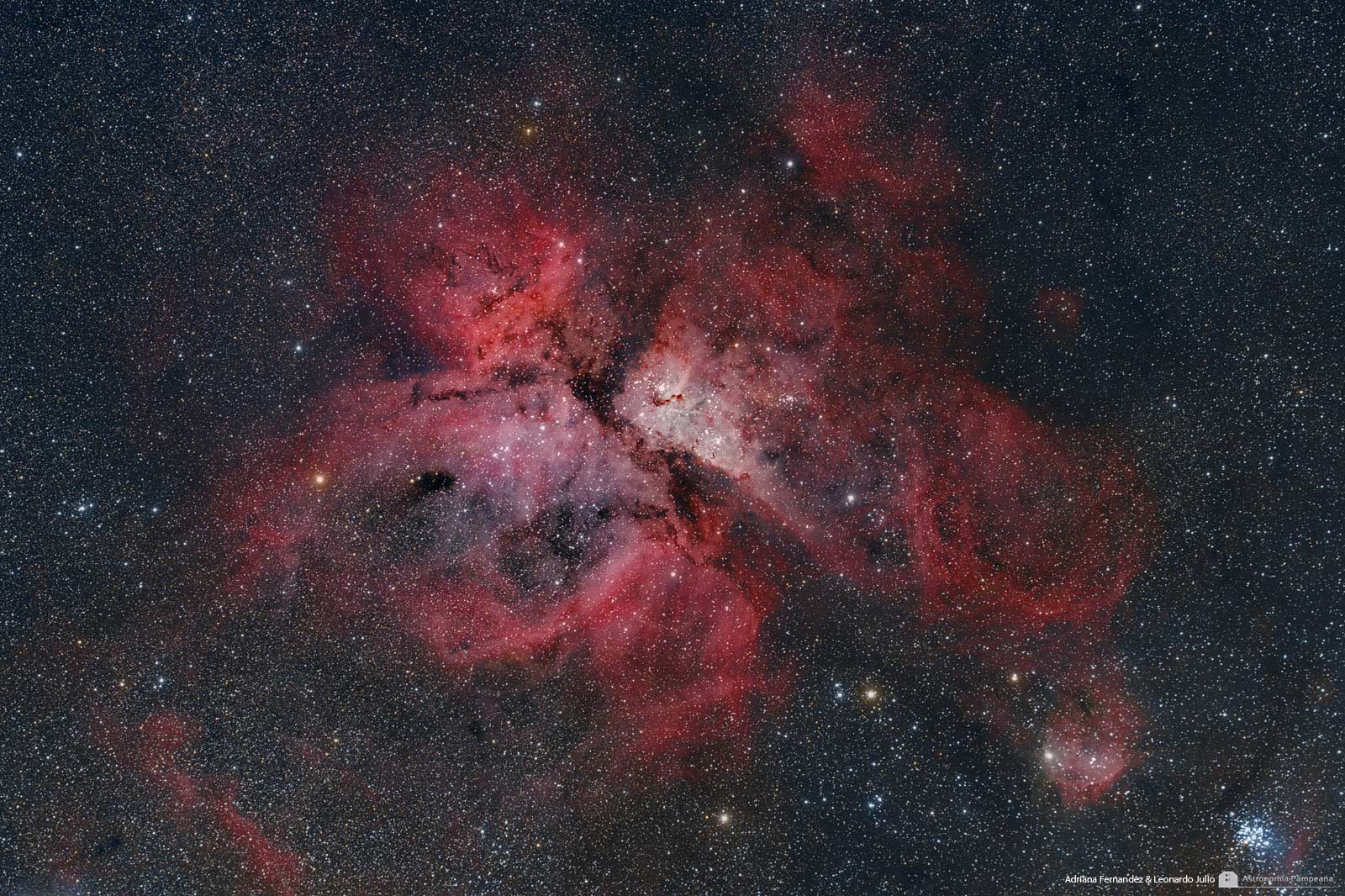
http://astronomiapampeana.com.ar/foto/1 ... ebula.html
Copiright: Adriana Fernandez y Leonardo Julio

Re: Submissions: 2013 July
A narrowband image of M8 (The Lagoon Nebula)
Copyrights: David Trappett
NEW nebula around star V2493Cyg Original image can be found here: http://www.rosa-remote.com/213.0.html
Credits: Knut Schäffner at ROSA Observatory
M20 (Diffuse Nebula)
Copyrights: Ian Polczynski from Perth, Australia
NEW nebula around star V2493Cyg Original image can be found here: http://www.rosa-remote.com/213.0.html
Credits: Knut Schäffner at ROSA Observatory
M20 (Diffuse Nebula)
Copyrights: Ian Polczynski from Perth, Australia
Re: Submissions: 2013 July
Perigee Moonrise over Rice Lake, Keene, Ontario, Canada (top)
Milky Way Galaxy above Rice Lake, Keene, Ontario, Canada (bottom)
Copyright: John Chumack
Milky Way Galaxy above Rice Lake, Keene, Ontario, Canada (bottom)
Copyright: John Chumack
Re: Submissions: 2013 July
Fly me to the Moon...
A Boeing 737 of Air France seen departing London-Heathrow, whilst a Boeing 757 of British Airways flies overhead...both against the backdrop of a half moon.
Copyright: Bob Holder
A Boeing 737 of Air France seen departing London-Heathrow, whilst a Boeing 757 of British Airways flies overhead...both against the backdrop of a half moon.
Copyright: Bob Holder
-
Salvatore Iovene
- Asternaut
- Posts: 3
- Joined: Thu Jul 04, 2013 7:54 am
Re: Submissions: 2013 July
A deep vdB142
http://www.astrobin.com/46870/
Copyright: Salvatore Iovene (http://iovene.com/), Samuel Díaz López (http://astrob.in/users/samueldl/)
51 hours went into the acquisition of this object, vdB142, part of the IC1396 copmlex. The image was composited as a Modified Hubble Palette, using Hydrogen Alpha, Sulphur II and Oxygen III filters.
The telescopes used were GSO RC8 and RC10, and the CCDs were Moravian Instruments G2-1600 and Atik 4000.
The image was collected during the last two weeks of June, totalling 102 sub-frames, 1800 seconds each.

(click image for full size)
http://www.astrobin.com/46870/
Copyright: Salvatore Iovene (http://iovene.com/), Samuel Díaz López (http://astrob.in/users/samueldl/)
51 hours went into the acquisition of this object, vdB142, part of the IC1396 copmlex. The image was composited as a Modified Hubble Palette, using Hydrogen Alpha, Sulphur II and Oxygen III filters.
The telescopes used were GSO RC8 and RC10, and the CCDs were Moravian Instruments G2-1600 and Atik 4000.
The image was collected during the last two weeks of June, totalling 102 sub-frames, 1800 seconds each.

(click image for full size)
Last edited by Salvatore Iovene on Thu Jul 04, 2013 7:56 pm, edited 2 times in total.
-
Paul Haese
- Ensign
- Posts: 80
- Joined: Tue Feb 01, 2011 10:38 pm
-
francescodib
- Ensign
- Posts: 33
- Joined: Fri May 03, 2013 9:03 am
- Location: Trinitapoli - 76015 - Italy
Re: Submissions: 2013 July
NGC 6960 - Western part of Veil Nebula
Copyright: Francesco di Biase - Italy
Copyright: Francesco di Biase - Italy
